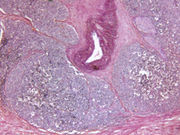Findings based on 10-year follow-up of localized prostate cancer patients
TUESDAY, April 12, 2016 (HealthDay News) — Iodine-125 permanent interstitial implantation is associated with long-term, biochemical control of localized prostate cancer, according to a study published online March 28 in the Journal of Medical Imaging and Radiation Oncology.
Craig Wilson, M.B.B.S., from Sir Charles Gairdner Hospital in Nedlands, Australia, and colleagues treated consecutive 207 patients with localized prostate cancer (September 1994 to November 2007) with iodine-125 permanent interstitial implantation. Three times a month, post-therapy assessment was conducted for clinical review and biochemical (prostate-specific antigen [PSA]) evaluation.
The researchers found that over a median follow-up of 7.8 years the 10-year biochemical disease-free survival (bDFS) for the entire cohort was 89 percent. By pre-treatment risk group, the 10-year bDFS estimates were 96 percent for low-risk, 83 percent for intermediate-risk, and 50 percent for high-risk disease. Pre-treatment PSA was an independent predictor of bDFS in multivariate analysis. There was not a significant effect of D90 dose (maximum dose delivered to 90 percent of the prostate volume) on bDFS. Late grade 3 or higher urinary and rectal toxicities had peak incidences of 10.7 and 1.1 percent, respectively.
“Excellent long-term biochemical control was demonstrated with iodine-125 permanent interstitial implantation in appropriately selected patients with prostate cancer,” the authors write.
Copyright © 2016 HealthDay. All rights reserved.








